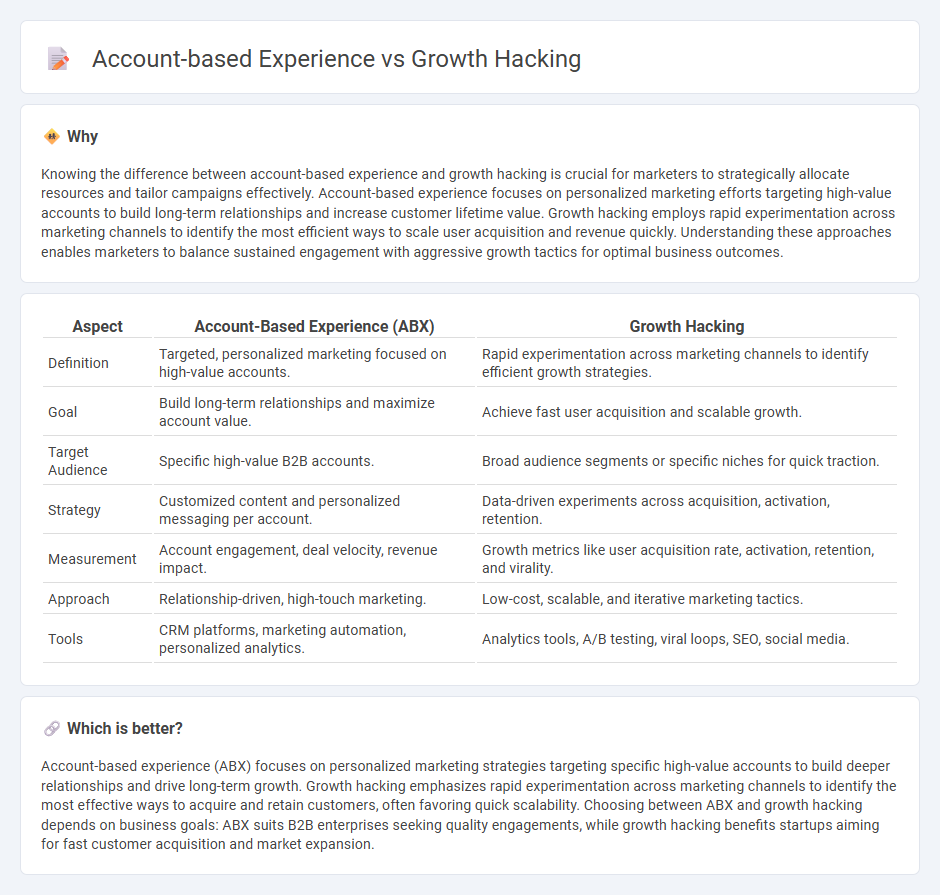
Account-based experience targets specific high-value clients by personalizing marketing efforts to align closely with their needs, enhancing engagement and conversion rates. Growth hacking focuses on rapid experimentation across marketing channels and product development to identify the most efficient strategies for scalable growth. Explore these innovative marketing approaches to optimize your business performance.
Why it is important
Knowing the difference between account-based experience and growth hacking is crucial for marketers to strategically allocate resources and tailor campaigns effectively. Account-based experience focuses on personalized marketing efforts targeting high-value accounts to build long-term relationships and increase customer lifetime value. Growth hacking employs rapid experimentation across marketing channels to identify the most efficient ways to scale user acquisition and revenue quickly. Understanding these approaches enables marketers to balance sustained engagement with aggressive growth tactics for optimal business outcomes.
Comparison Table
| Aspect | Account-Based Experience (ABX) | Growth Hacking |
|---|---|---|
| Definition | Targeted, personalized marketing focused on high-value accounts. | Rapid experimentation across marketing channels to identify efficient growth strategies. |
| Goal | Build long-term relationships and maximize account value. | Achieve fast user acquisition and scalable growth. |
| Target Audience | Specific high-value B2B accounts. | Broad audience segments or specific niches for quick traction. |
| Strategy | Customized content and personalized messaging per account. | Data-driven experiments across acquisition, activation, retention. |
| Measurement | Account engagement, deal velocity, revenue impact. | Growth metrics like user acquisition rate, activation, retention, and virality. |
| Approach | Relationship-driven, high-touch marketing. | Low-cost, scalable, and iterative marketing tactics. |
| Tools | CRM platforms, marketing automation, personalized analytics. | Analytics tools, A/B testing, viral loops, SEO, social media. |
Which is better?
Account-based experience (ABX) focuses on personalized marketing strategies targeting specific high-value accounts to build deeper relationships and drive long-term growth. Growth hacking emphasizes rapid experimentation across marketing channels to identify the most effective ways to acquire and retain customers, often favoring quick scalability. Choosing between ABX and growth hacking depends on business goals: ABX suits B2B enterprises seeking quality engagements, while growth hacking benefits startups aiming for fast customer acquisition and market expansion.
Connection
Account-based experience (ABX) and growth hacking both focus on targeted strategies to accelerate business development by prioritizing high-value accounts. ABX enhances personalized marketing tactics to improve engagement and conversion rates within specific accounts, while growth hacking employs rapid experimentation and data-driven insights to optimize growth funnels efficiently. Integrating ABX with growth hacking techniques allows marketers to scale tailored campaigns that drive accelerated revenue growth and customer retention.
Key Terms
Growth Hacking:
Growth hacking emphasizes rapid experimentation across marketing channels to identify the most effective, low-cost strategies for scaling user acquisition and engagement. It leverages data analytics, viral marketing, and automation tools to optimize conversion rates and accelerate business growth. Explore how growth hacking can transform your startup's trajectory with innovative, performance-driven tactics.
Virality
Growth hacking leverages rapid experimentation across marketing channels to drive exponential user acquisition and virality through tactics like referral programs and viral loops. Account-based experience (ABX) tailors personalized, multi-channel engagements targeting specific high-value accounts to strengthen relationships and optimize conversion rates, focusing more on quality than quantity. Explore how combining growth hacking with ABX can maximize virality and accelerate business growth.
Rapid Experimentation
Growth hacking leverages rapid experimentation across marketing channels to identify the most effective strategies for scaling business growth quickly. Account-based experience centers on tailored, personalized campaigns targeting high-value accounts to maximize engagement and conversion rates. Explore how these approaches utilize rapid experimentation for optimized growth outcomes.
Source and External Links
Growth hacking - Growth hacking is a marketing subfield focused on the rapid growth of a company through conducting experiments such as A/B testing to improve the customer journey, combining skills from marketing, development, and product management to scale what works and abandon what doesn't, often used by startups and larger companies alike.
What is growth hacking? - Growth hacking has evolved with techniques like AI-driven personalization and voice search optimization, focusing on deeply understanding data to improve user experience, though it faces criticism for sometimes prioritizing quick fixes over comprehensive marketing strategies.
What Is Growth Hacking? Simple Definition + How to Get Started - Growth hacking involves strategies to rapidly increase users and revenue with minimal expense by optimizing the entire customer funnel (acquisition, activation, retention, referral, revenue), starting with product-market fit and continuous testing and iteration.
 dowidth.com
dowidth.com